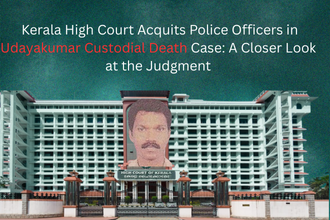In a deeply human and thought-provoking judgment, the Kerala High Court recently granted bail to a 91-year-old man, Thevan, who was arrested for stabbing his 88-year-old wife, Kunjali, following a domestic altercation. The case, Thevan v. State of Kerala, has captured national attention not just for the unusual age of the parties involved, but for the Court’s sensitive approach in dealing with a painful incident within the framework of aging, love, and companionship.
Background of the Case: A Domestic Dispute Turned Violent
The incident occurred on March 21, 2025, when Thevan allegedly stabbed his wife after she accused him of maintaining illicit relationships with other women. According to the prosecution, the confrontation escalated following repeated verbal altercations between the elderly couple. Thevan, reportedly unable to bear the accusations, responded with violence, causing serious injuries to his wife.
He was arrested on the same day and booked under Sections 118(1) (Voluntarily causing grievous hurt by dangerous weapons) and 109(1) (Attempt to commit murder) of the Bharatiya Nyaya Sanhita, the new criminal code that replaced the IPC.
Bail Plea and Court Observations
The bail application was heard by Justice PV Kunhikrishnan, who is known for his empathetic and philosophically rich judicial writings. While examining the bail plea, the Court acknowledged the gravity of the offense but opted for a compassionate view considering the unique context of the case: the extreme age of both parties and their long-standing marital bond.
“Old Age Is for Support, Not Strife”: A Judicial Reflection on Marriage and Aging
In a rare display of judicial empathy, the Court used the opportunity to deliver a heartfelt message on the importance of mutual support in old age. Justice Kunhikrishnan remarked:
“The petitioner – Thevan should know that in his old age, his only strength will be his wife, Kunjali, aged 88. And Kunjali also should think that her only strength will be Thevan, aged 91. A great marriage is not when the ‘perfect couple’ comes together; it is when imperfect couples learn to enjoy their differences.”
The Court went further to quote Malayalam poet *NN Kakkad’s renowned work *‘Saphalamee Yathra’ (Let This Journey Be Fruitful), stating:
“As we grow older, our love for each other only deepens.”
This literary reference added a poetic touch to the judgment, reminding the public and litigants that the law can also be a source of wisdom, healing, and restoration—not merely punishment.
Conditions of Bail
While allowing the bail, the Court imposed the following conditions:
- Thevan must execute a bond of ₹50,000 with two solvent sureties.
- He must cooperate with the investigation and appear before the police as and when required.
- Any attempt to interfere with the victim or the investigation would result in cancellation of bail.
Thevan was represented by Advocates Subi K and Bijeesh Krishnan, while Public Prosecutor G Sudheer appeared for the State of Kerala.
A Rare Case of Justice with a Human Touch
This judgment stands out in an era where most bail orders are mechanical and legalistic. Justice Kunhikrishnan’s order is a reminder that the role of a judge is not only to uphold the law but also to consider the social, emotional, and psychological context of the parties involved. In cases involving senior citizens, especially in domestic disputes, a rehabilitative and reconciliatory approach is often more effective than pure retribution.
The Court’s order also opens up a broader conversation around elderly mental health, marital discord in old age, and the need for social support systems for senior citizens.
Elder Abuse or Emotional Mismanagement? The Line Is Blurry
While the injuries suffered by Kunjali are serious and must not be trivialized, the judgment urges society to understand the fragile emotional state of elderly couples, who often face isolation, health issues, and financial insecurity. In this case, the lack of a support network may have allowed a domestic argument to escalate into physical violence.
The Court, instead of imposing harsh punishment, chose to offer the couple a chance at reconciliation—hoping that they could “complete their innings of life with happiness.”
Relevance in Contemporary Society
India is witnessing a demographic transition with a growing elderly population. Cases like Thevan v State of Kerala highlight an urgent need to focus on:
- Mental health care for senior citizens
- Conflict resolution mechanisms for elderly couples
- Community-based support systems to prevent isolation
- Legal reforms that incorporate restorative justice principles
Judiciary’s Expanding Role in Social Healing
Justice Kunhikrishnan’s judgment also reaffirms the judiciary’s moral authority in guiding not just litigants but society at large. By referencing literature, advocating emotional wisdom, and focusing on human relationships, the judgment moves beyond mere legal formalism and into the realm of social transformation.
This kind of approach resonates with the Indian constitutional vision of justice as not merely punitive, but restorative and rehabilitative.
Conclusion: A Second Chance for Love in Old Age
In granting bail to Thevan, the Kerala High Court did more than resolve a legal dispute—it sent a powerful message on empathy, reconciliation, and the sanctity of companionship in old age. The case underscores the complex dynamics of marital relationships, even in their twilight years, and the role of the courts in preserving not just justice, but also dignity and humanity.
As India’s legal landscape continues to evolve with the implementation of the Bharatiya Nyaya Sanhita, such judgments provide a blueprint for a more compassionate and contextualized legal system—one that balances legal rigor with human sensitivity.


